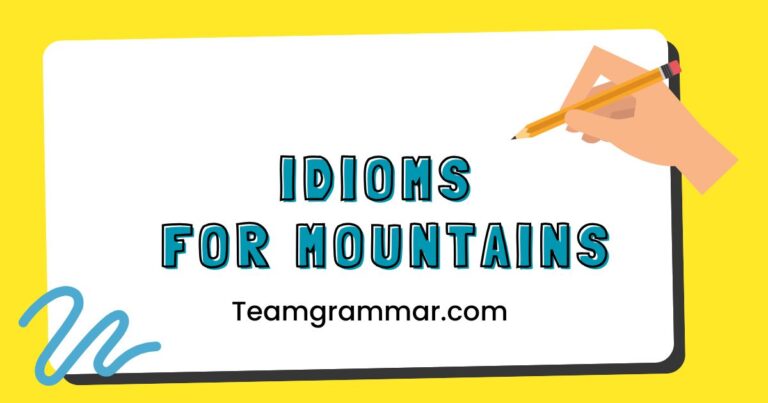49 Idioms for Wasting Time: Master English Expressions
Understanding idioms is crucial for mastering English, as they add color and depth to communication. Idioms related to wasting time are particularly useful in everyday conversations, allowing you to express frustration, amusement, or concern about unproductive activities.
This article provides a comprehensive guide to idioms about wasting time, offering definitions, examples, and practice exercises. It is designed for English language learners of all levels, from beginners to advanced speakers, who want to enhance their vocabulary and comprehension skills.
By exploring these idioms, you will not only improve your understanding of idiomatic expressions but also gain insights into the cultural nuances of the English language. Whether you’re preparing for an English exam, aiming to improve your conversational skills, or simply interested in expanding your vocabulary, this guide will equip you with the knowledge and tools to effectively use and understand idioms related to wasting time.
Table of Contents
- Definition of Idioms for Wasting Time
- Structural Breakdown
- Types and Categories of Time-Wasting Idioms
- Examples of Idioms for Wasting Time
- Usage Rules for Time-Wasting Idioms
- Common Mistakes with Time-Wasting Idioms
- Practice Exercises
- Advanced Topics
- Frequently Asked Questions
- Conclusion
Definition of Idioms for Wasting Time
Idiomsare expressions whose meanings cannot be understood from the ordinary meanings of the individual words. They are a type of figurative language that adds richness and color to communication.
Idioms related to wasting time specifically describe activities or situations where time is being used in an unproductive or frivolous manner.
These idioms can be classified based on their function. Some idioms describe the act of wasting time directly, while others focus on the futility or pointlessness of certain activities.
Understanding the context in which these idioms are used is crucial for accurate interpretation. For instance, an idiom might be used to express frustration with someone’s procrastination, or it might be used humorously to describe one’s own unproductive behavior.
The context in which these idioms are used is also essential. A formal setting might not be the best place to use some of the more colloquial idioms.
Conversely, informal conversations are a great place to use them to add color and personality to your speech.
Structural Breakdown
The structure of idioms related to wasting time varies. Some idioms are phrases, while others are complete sentences.
Many idioms consist of a verb and a preposition, or a verb and an adverb. The key is that the meaning of the idiom is not literal; it is figurative and culturally specific.
For example, the idiom “killing time” consists of the verb “killing” and the noun “time.” However, the meaning is not literally about ending time, but about occupying oneself with a trivial activity to make time pass more quickly. Similarly, “spinning one’s wheels” uses the imagery of a car stuck in mud to convey the idea of making no progress despite expending effort.
Understanding the structural components of idioms can help in memorizing and using them correctly. Paying attention to the verbs, nouns, and prepositions that make up the idiom can provide clues to its meaning and usage.
Types and Categories of Time-Wasting Idioms
Idioms for wasting time can be categorized based on their specific connotations. Here are some common categories:
1. Procrastination Idioms
These idioms describe the act of delaying or postponing tasks. They often convey a sense of avoidance or reluctance to start something important.
For example, “putting off until tomorrow what you can do today” encapsulates the essence of procrastination.
2. Futile Effort Idioms
This category includes idioms that describe activities that are unproductive or lead to no meaningful results. They often involve expending energy without achieving any tangible outcome.
An example is “beating a dead horse,” which means to waste effort on something that is already over or impossible to change.
3. Idle Activity Idioms
These idioms refer to activities that are aimless or without purpose. They often describe situations where someone is simply passing time without any specific goal in mind.
“Twiddling one’s thumbs” is a classic example, suggesting a state of boredom and inactivity.
4. Inefficient Use of Time Idioms
This category includes idioms that describe using time poorly or in a way that does not maximize productivity. They often involve distractions or interruptions that prevent someone from focusing on important tasks.
An example is “wasting time on trivialities,” which means focusing on unimportant details instead of significant matters.
Examples of Idioms for Wasting Time
The following tables provide numerous examples of idioms for wasting time, categorized for better understanding. Each idiom is accompanied by a definition and example sentence to illustrate its usage.
Table 1: Procrastination Idioms
This table focuses on idioms related to procrastination, the act of delaying or postponing tasks.
| Idiom | Definition | Example Sentence |
|---|---|---|
| Putting off until tomorrow what you can do today | Delaying a task that could be done immediately. | I know I should start studying, but I’m putting off until tomorrow what I can do today. |
| Dragging your feet | Being deliberately slow or reluctant in doing something. | He’s been dragging his feet on this project for weeks now. |
| Stalling for time | Deliberately delaying something. | The politician was clearly stalling for time, avoiding the real questions. |
| Putting something on the back burner | Postponing a task to a later time. | We had to put the marketing campaign on the back burner due to budget cuts. |
| Kicking the can down the road | Avoiding or delaying a problem or decision. | The government is just kicking the can down the road by not addressing the issue now. |
| Leave it for another day | Postponing something to a future time. | I’m too tired to finish this report; I’ll just leave it for another day. |
| Defer to later | To put off to a future time. | Let’s defer this decision to later when we have more information. |
| Procrastinate | To delay or postpone action; put off doing something. | I know I need to finish this report, but I always procrastinate. |
| Hold off | Delay taking action. | Let’s hold off on making a decision until we hear from all parties involved. |
| Shelve | To put aside or postpone. | The project was shelved due to lack of funding. |
| Table | To postpone consideration of. | The motion was tabled until the next meeting. |
| Wait to see | Delay action to observe developments. | We’ll wait to see how the situation unfolds before making any decisions. |
| Take a rain check | Postpone a plan to a later date. | I’m busy tonight, can I take a rain check on dinner? |
| Delay | To put off to a later time; postpone. | We had to delay the start of the project due to unforeseen circumstances. |
| Postpone | To put off to a later time; defer. | The meeting has been postponed until next week. |
| Hold over | To postpone to a future time or date. | The issue was held over for further discussion. |
| Put over | To postpone or delay. | Let’s put over the discussion until tomorrow morning. |
| Set aside | To put aside for later consideration. | We’ll set aside this issue for further review. |
| Slow-walk | To deliberately delay or obstruct a process. | They are slow-walking the approval process to prevent the project from moving forward. |
| Let slide | To ignore or postpone dealing with something. | I decided to let it slide this time, but I won’t tolerate it again. |
| Take a breather | To pause or delay before continuing. | Let’s take a breather before tackling the next task. |
| Mark time | To do something without making real progress; to stall. | The team is just marking time until the new manager arrives. |
| Play for time | To delay in order to gain an advantage. | The lawyer was playing for time to gather more evidence. |
| Buy time | To gain extra time by delaying something. | We need to buy time to complete the negotiations. |
| Push back | To postpone or delay an event or deadline. | We had to push back the deadline due to unexpected delays. |
Table 2: Futile Effort Idioms
This table provides idioms that describe activities that are unproductive or lead to no meaningful results.
| Idiom | Definition | Example Sentence |
|---|---|---|
| Beating a dead horse | Wasting effort on something that is over or impossible to change. | I think we’re beating a dead horse; there’s no point in arguing about it anymore. |
| Flogging a dead horse | Similar to ‘beating a dead horse,’ wasting effort on something futile. | Trying to convince him is like flogging a dead horse. |
| Spinning your wheels | Expending effort without making progress. | I feel like I’m just spinning my wheels at this job. |
| Chasing your tail | Engaging in frantic but unproductive activity. | I’ve been chasing my tail all day, but I haven’t accomplished anything. |
| Going around in circles | Making no progress; repeating the same actions without result. | We’re just going around in circles with this discussion. |
| Barking up the wrong tree | Pursuing a mistaken or misguided course of action. | If you think he’s the one who stole your wallet, you’re barking up the wrong tree. |
| Pouring water into a sieve | Wasting effort on something that cannot be retained. | Trying to teach him is like pouring water into a sieve. |
| Sisyphusian task | A task that is endless and futile. | Cleaning the house with kids is a Sisyphusian task. |
| Tilting at windmills | Fighting imaginary enemies or pursuing unrealistic goals. | Arguing with him about politics is like tilting at windmills. |
| A fool’s errand | A task that has no hope of success. | Sending him to find the missing file is a fool’s errand. |
| A lost cause | Something that has no chance of succeeding. | Trying to fix this old car is a lost cause. |
| Hitting your head against a brick wall | Trying to do something that is impossible. | Trying to convince them is like hitting your head against a brick wall. |
| Water off a duck’s back | Having no effect on someone or something. | Criticism is like water off a duck’s back to him. |
| A shot in the dark | An attempt that has little chance of success. | Applying for that job was just a shot in the dark. |
| A wild goose chase | A fruitless search for something that is nonexistent or unattainable. | They sent us on a wild goose chase looking for the missing documents. |
| Climbing up a greasy pole | Trying to achieve something very difficult. | Getting promoted in this company is like climbing up a greasy pole. |
| Pushing water uphill | Attempting something extremely difficult or impossible. | Trying to change his mind is like pushing water uphill. |
| Building castles in the air | Daydreaming or making plans that are unlikely to come true. | They’re just building castles in the air with their unrealistic expectations. |
| Churning water | Engaging in activity that produces no results. | The team is just churning water, not making any real progress. |
| Empty gestures | Actions that appear meaningful but have no real effect. | Their promises were just empty gestures. |
| Paper-pushing | Dealing with routine administrative tasks that have little real value. | He spends most of his day paper-pushing. |
| Going nowhere fast | Making no progress despite being busy. | We’re going nowhere fast with this approach. |
| Floundering | Struggling or making little progress. | The project is floundering due to lack of direction. |
| Muddling through | Making slow or uncertain progress. | We’re just muddling through, hoping to find a solution. |
| Stumbling in the dark | Proceeding without clear direction or understanding. | We’re stumbling in the dark, trying to figure out what to do next. |
Table 3: Idle Activity Idioms
This table focuses on idioms related to idle activities, which are aimless or without purpose.
| Idiom | Definition | Example Sentence |
|---|---|---|
| Twiddling your thumbs | Doing nothing; being idle. | I was just twiddling my thumbs waiting for the meeting to start. |
| Killing time | Occupying oneself with a trivial activity to make time pass more quickly. | We were killing time at the airport by playing cards. |
| Whiling away the hours | Passing time in a pleasant or leisurely way. | We spent the afternoon whiling away the hours at the beach. |
| Loafing around | Spending time in an idle or lazy way. | The teenagers were loafing around at the mall. |
| Lazing around | Relaxing and doing nothing. | I spent the entire weekend lazing around. |
| Taking it easy | Relaxing and avoiding hard work or stress. | He’s been taking it easy since he retired. |
| Hanging out | Spending time relaxing or socializing. | We were just hanging out at the park. |
| Vegetating | Spending time in a passive and inactive way. | I spent the evening vegetating in front of the TV. |
| Doing nothing | Engaging in no activity. | I spent the day doing nothing but relaxing. |
| Being a couch potato | Spending a lot of time sitting and watching television. | He’s turned into a real couch potato since he got his new TV. |
| Chilling out | Relaxing and calming down. | We were just chilling out after a long day. |
| Taking a break | Pausing from activity to rest. | Let’s take a break and get some coffee. |
| Resting on your laurels | Relying on past achievements and not making new efforts. | He’s been resting on his laurels since his last success. |
| Daydreaming | Engaging in wishful thinking. | She was daydreaming about her vacation. |
| Slacking off | Avoiding work or responsibility. | He’s been slacking off lately. |
| Shilly-shallying | Failing to act decisively. | Stop shilly-shallying and make a decision. |
| Wasting time on social media | Spending too much time on social networking sites. | I wasted time on social media instead of finishing my work. |
| Window shopping | Looking at goods displayed in shop windows without intending to buy them. | We went window shopping to kill some time. |
| Going for a stroll | Taking a leisurely walk. | We went going for a stroll in the park to enjoy the weather. |
| Browsing aimlessly | Looking through items without a specific purpose. | I was just browsing aimlessly in the bookstore. |
| Dilly-dallying | Wasting time through aimless wandering or indecision. | Stop dilly-dallying and get to work. |
| Taking a scenic route | Choosing a longer route for the pleasure of the scenery. | We decided to take a scenic route on our road trip. |
| Taking a detour | Departing from a direct route. | We took a detour to visit a local attraction. |
| Taking a sabbatical | Taking time off from work for rest or study. | She took a sabbatical to write a book. |
| Taking a vacation | Taking time off from work for leisure. | We took a vacation to relax and recharge. |
Table 4: Inefficient Use of Time Idioms
This table provides idioms that describe using time poorly or in a way that does not maximize productivity.
| Idiom | Definition | Example Sentence |
|---|---|---|
| Wasting time on trivialities | Focusing on unimportant details instead of significant matters. | He’s always wasting time on trivialities instead of addressing the real issues. |
| Missed the boat | Missed an opportunity due to delay or inaction. | They missed the boat by not investing in that company earlier. |
| Lost time is never found again | Time that is wasted can never be recovered. | Remember, lost time is never found again, so use your time wisely. |
| Penny wise, pound foolish | Being careful about small amounts of money while being careless about large amounts. | They were penny wise, pound foolish by cutting costs on essential maintenance. |
| Spreading yourself too thin | Trying to do too many things at once, resulting in inefficiency. | He’s spreading himself too thin by taking on too many projects. |
| Burning the candle at both ends | Working too hard and not getting enough rest. | She’s been burning the candle at both ends trying to meet the deadline. |
| Cutting corners | Doing something poorly to save time or money. | They cut corners on the project, resulting in poor quality. |
| Taking the long way around | Choosing a longer or more complicated route. | He always takes the long way around to avoid traffic. |
| Getting sidetracked | Being distracted from the main task. | I keep getting sidetracked by emails and phone calls. |
| Going off on a tangent | Digressing from the main subject. | He always goes off on a tangent during meetings. |
| Getting bogged down in details | Becoming overly concerned with minor details. | We’re getting bogged down in details and losing sight of the big picture. |
| Reinventing the wheel | Wasting time and effort by creating something that already exists. | They’re reinventing the wheel by developing a new system that already exists. |
| Missing the forest for the trees | Focusing on details and failing to see the overall situation. | He’s missing the forest for the trees by focusing on minor issues. |
| Putting the cart before the horse | Doing things in the wrong order. | They’re putting the cart before the horse by planning the marketing campaign before developing the product. |
| Running around like a headless chicken | Acting in a frantic and disorganized manner. | He’s been running around like a headless chicken trying to meet the deadline. |
| Not seeing the wood for the trees | Similar to missing the forest for the trees; failing to grasp the whole picture due to focus on details. | They are not seeing the wood for the trees when they focus solely on individual tasks. |
| Overthinking | Thinking about something too much, leading to inaction. | You’re overthinking the problem. Just make a decision. |
| Being indecisive | Having difficulty making decisions. | His being indecisive is wasting everyone’s time. |
| Procrastinating | Intentionally delaying or postponing tasks. | She’s always procrastinating, which causes delays. |
| Getting lost in the weeds | Becoming entangled in minor details. | We’re getting lost in the weeds and losing sight of the main goal. |
| Wasting time on the small stuff | Focusing on unimportant tasks. | Don’t waste time on the small stuff when there are bigger issues to address. |
| Taking too long | Spending an excessive amount of time on a task. | You’re taking too long to complete this assignment. |
| Being inefficient | Not using time or resources effectively. | The office is being inefficient in managing its workload. |
| Not prioritizing | Failing to rank tasks in order of importance. | They are not prioritizing tasks effectively. |
| Getting distracted easily | Being easily diverted from the task at hand. | He is getting distracted easily and not staying focused. |
Usage Rules for Time-Wasting Idioms
When using idioms related to wasting time, it’s important to consider the context and audience. Some idioms are more formal than others, and some may not be appropriate in certain situations.
Here are some general rules to follow:
- Understand the meaning: Make sure you fully understand the meaning of the idiom before using it. Using an idiom incorrectly can lead to confusion or miscommunication.
- Consider the context: Use idioms that are appropriate for the situation. Avoid using overly casual or slang idioms in formal settings.
- Know your audience: Be mindful of your audience’s familiarity with idioms. If you’re speaking to non-native English speakers, it’s best to use idioms sparingly or explain their meaning.
- Use them sparingly: While idioms can add color to your speech, overusing them can make your language sound unnatural or forced.
- Practice: The best way to master idioms is to practice using them in conversation and writing. Pay attention to how native speakers use idioms and try to incorporate them into your own language.
Also, remember that some idioms have variations. For example, “beating a dead horse” is sometimes expressed as “flogging a dead horse.” While the meaning is the same, it’s good to be aware of these variations.
Common Mistakes with Time-Wasting Idioms
Here are some common mistakes that learners make when using idioms related to wasting time:
- Misinterpreting the meaning: One of the most common mistakes is misunderstanding the meaning of the idiom. This can lead to using it in the wrong context or conveying the wrong message.
- Using them literally: Idioms are figurative expressions, so it’s important not to interpret them literally. For example, “killing time” doesn’t mean actually ending time, but rather occupying oneself with a trivial activity.
- Using the wrong form: Some idioms have specific grammatical structures that must be followed. Using the wrong form can make the idiom sound awkward or incorrect.
- Overusing idioms: While idioms can add color to your speech, overusing them can make your language sound unnatural.
Here are some examples of correct and incorrect usage:
| Incorrect | Correct | Explanation |
|---|---|---|
| He is literally killing time. | He is killing time by reading a book. | “Killing time” is a figurative expression, not a literal one. |
| We are beating the dead dog. | We are beating a dead horse. | The correct idiom is “beating a dead horse,” not “beating a dead dog.” |
| She is spinning her car wheels. | She is spinning her wheels. | The correct idiom is “spinning one’s wheels,” not “spinning her car wheels.” |
Practice Exercises
Test your understanding of idioms for wasting time with these practice exercises.
Exercise 1: Fill in the Blanks
Fill in the blanks with the appropriate idiom from the list below.
Idiom List: beating a dead horse, killing time, spinning your wheels, putting off until tomorrow, missing the boat
| Question | Answer |
|---|---|
| 1. I know I should start studying, but I’m ____________ what I can do today. | putting off until tomorrow |
| 2. We were ____________ at the airport by playing cards. | killing time |
| 3. I feel like I’m just ____________ at this job; I’m not making any progress. | spinning your wheels |
| 4. I think we’re ____________; there’s no point in arguing about it anymore. | beating a dead horse |
| 5. They ____________ by not investing in that company earlier. | missed the boat |
| 6. He keeps ____________ by checking social media every few minutes. | killing time |
| 7. Stop ____________ and start working on the project! | putting off until tomorrow |
| 8. Trying to change his mind is like ____________. | beating a dead horse |
| 9. They are ____________ if they think they can still get the deal. | spinning their wheels |
| 10. The company ____________ by not adopting the new technology sooner. | missed the boat |
Exercise 2: Multiple Choice
Choose the correct meaning of the idiom in each sentence.
| Question | Options | Answer |
|---|---|---|
| 1. He’s been dragging his feet on this project for weeks. What does “dragging his feet” mean? | a) Moving quickly, b) Being deliberately slow, c) Working hard | b) Being deliberately slow |
| 2. The politician was clearly stalling for time, avoiding the real questions. What does “stalling for time” mean? | a) Speaking quickly, b) Answering directly, c) Deliberately delaying | c) Deliberately delaying |
| 3. We had to put the marketing campaign on the back burner due to budget cuts. What does “put on the back burner” mean? | a) Cancel completely, b) Postpone to a later time, c) Start immediately | b) Postpone to a later time |
| 4. The government is just kicking the can down the road by not addressing the issue now. What does “kicking the can down the road” mean? | a) Solving the problem, b) Avoiding the problem, c) Ignoring the problem | b) Avoiding the problem |
| 5. I’m too tired to finish this report; I’ll just leave it for another day. What does “leave it for another day” mean? | a) Do it now, b) Postpone it, c) Forget about it | b) Postpone it |
| 6. Don’t spin your wheels trying to fix that old computer; it’s beyond repair. | a) Make progress, b) Exert effort fruitlessly, c) Relax and take it easy | b) Exert effort fruitlessly |
| 7. They are barking up the wrong tree if they think I was responsible for the mistake. | a) Looking in the right place, b) Looking in the wrong place, c) Being helpful | b) Looking in the wrong place |
| 8. If we’re just killing time, why don’t we go for a walk? | a) Being productive, b) Wasting time, c) Relaxing | b) Wasting time |
| 9. He’s always wasting time on trivialities instead of addressing the real issues. | a) Important matters, b) Unimportant details, c) Urgent tasks | b) Unimportant details |
| 10. They missed the boat by not investing in that company earlier. | a) Seized an opportunity, b) Missed an opportunity, c) Created an opportunity | b) Missed an opportunity |
Advanced Topics
For advanced learners, it’s useful to understand the origins and cultural contexts of idioms. Many idioms have historical roots or derive from specific cultural practices.
For example, the idiom “beating a dead horse” is thought to originate from the practice of attempting to revive a horse that is already dead, highlighting the futility of the effort.
Additionally,
understanding regional variations in idiom usage can be beneficial. While many idioms are widely understood, some may be more common in certain regions or dialects of English.
For instance, an idiom used in British English may not be as familiar to speakers of American English, and vice versa.
Exploring the use of idioms in literature and media can also deepen your understanding. Authors and filmmakers often use idioms to add depth and authenticity to their characters and stories.
Analyzing these examples can provide valuable insights into how idioms are used in context and how they contribute to the overall meaning of the work.
Frequently Asked Questions
Conclusion
Mastering idioms for wasting time is a valuable skill for English language learners. By understanding the definitions, structures, and usage rules of these idioms, you can enhance your vocabulary, improve your comprehension skills, and communicate more effectively.
Remember to practice using idioms in context and be mindful of your audience. With consistent effort, you can confidently incorporate idioms into your everyday conversations and writing, adding color and depth to your language.







